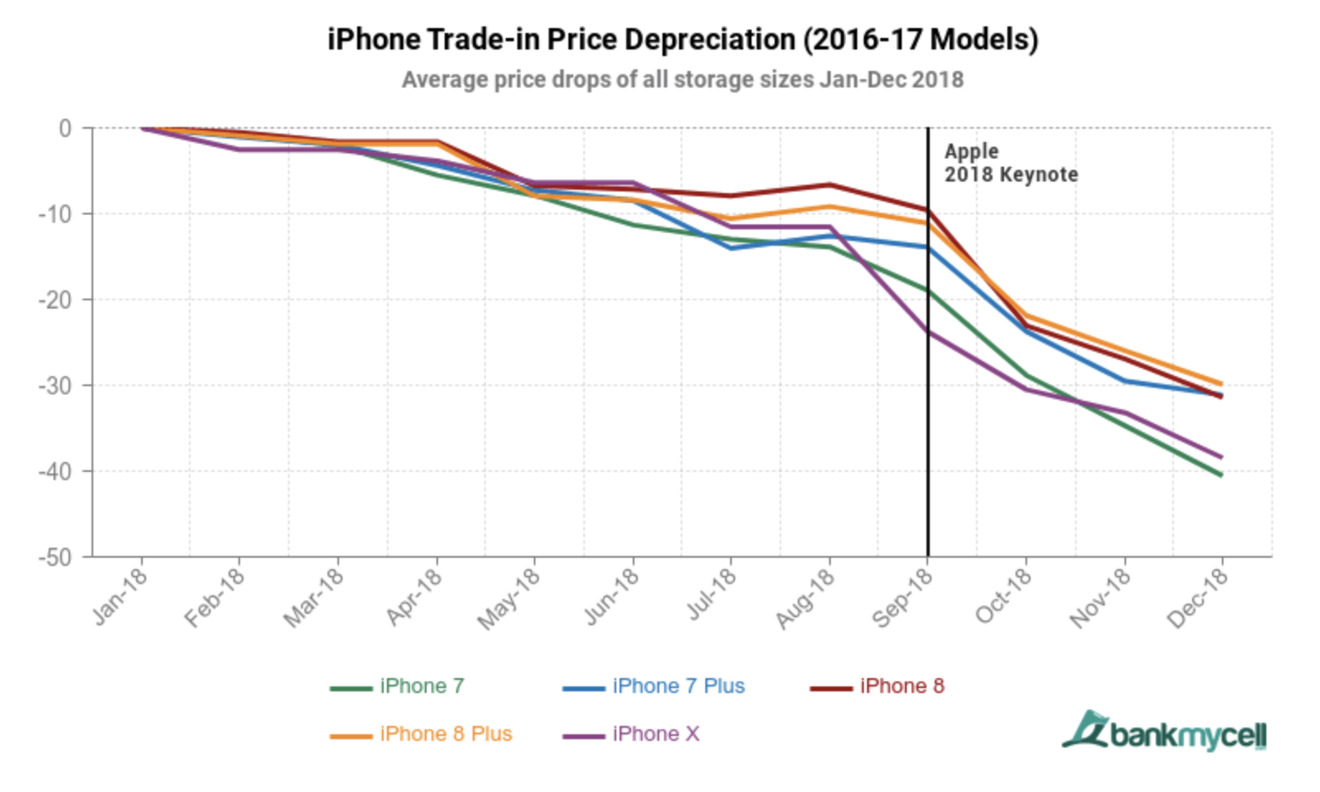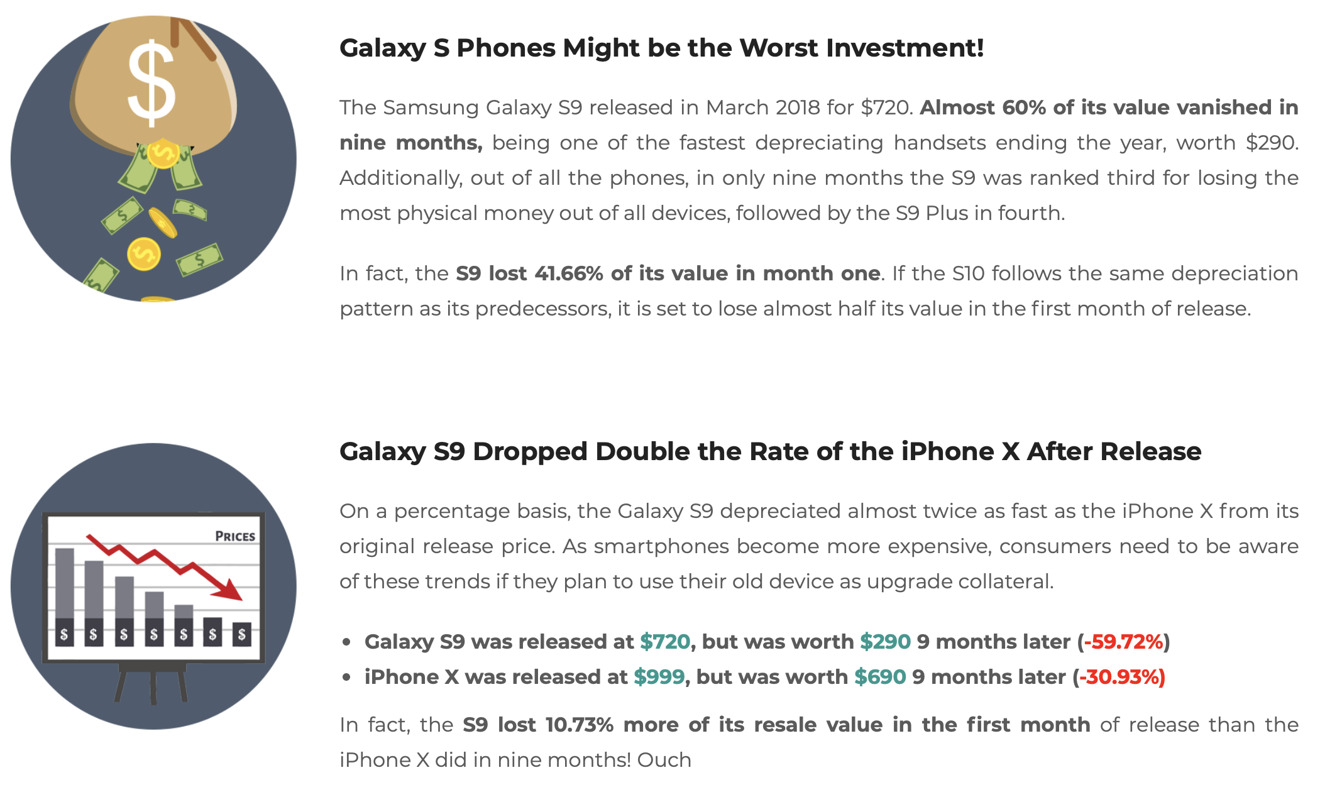Despite concerns voiced about the price of iPhone X, Apple's modern Face ID models have proven to be the company's most popular phones. In part, that's because buyers know they can invest in the latest iPhone and later resell it to buy the next new model, because iPhones retain a resale value much better than premium-priced Androids.
A new report by reseller Bank My Cell reaffirms the dramatic difference in resale value between Apple's iPhones and similarly priced premium Androids from Samsung, Huawei, LG, Sony, Lenovo, and others over the past year.
Resale value is seldom considered by reviewers discussing the upfront price of a device. Yet for a major purchase like a $999 iPhone X, the fact that it only depreciated by 30 percent over the first nine months is a substantial factor in buying it. With a resale value of $690, buyers can trade in their existing model and apply the residual value towards the purchase of a brand new iPhone XS.
In contrast, over the same nine-month period from its debut, Samsung's Galaxy S9 crashed in value by 60 percent— twice that of iPhone X — leaving just $290 left in trade in value. The report noted, "In fact, the S9 lost 10.73% more of its resale value in the first month of release than the iPhone X did in nine months! Ouch."
This year, Apple's latest iPhone XR, iPhone XS and iPhone XS Max models have similarly retained about 85 percent to 95 percent of their original sale value. Therefore, buyers who want to stay on the bleeding edge of Apple's technology curve can do so by trading up on a regular basis, rather than only throwing new money at every future model released.
Timing iPhone trade-ins to lock in the best resale price
However, because so many users aim to trade in their iPhone for new ones, the market resale value also dips fastest just as Apple announces new models, usually in September.
The report noted that "customers that take advantage of trade-in stores' 30-day price lock could have earned $100+ more selling an iPhone X before the event. Consumers should be aware that there is no obligation to send their device in, essentially they can lock the price and decide if they want the new phone after its announcement event."
Apple's new iPhone announcements cause the fastest drop in resale value for existing phones, a phenomenon the reseller called a "trade-in black hole consumers should avoid." However, it also noted that after an initial rush to trade in iPhones for new models, the resale value of iPhones actually improve.
Three months after the "black hole" in valuation depressed by the newest arrivals, Bank My Cell noted that "iPhone values trend upwards every January," pointing out that "the new iPhone XS/XR range and the iPhone X/8 saw trade-in price increases as we entered 2019."
The excitement of new iPhone launches impacting trade in value isn't observed among Androids. Even for Samsung, the biggest spender among Android licensees in marketing and launch extravaganzas, the report noted that "when tracking the 2015-2017 Galaxy S6-S8 models, most only saw drops of between 5 percent and 13 percent in weeks following the March Galaxy S9 release."
Resale value supports higher priced iPhones
The ability of iPhones to retain their resale value has incrementally enabled Apple to offer more premium tiers of iPhones, because customers aren't paying full retail price to buy the latest models.
Apple itself has worked to introduce its "Give Back" own trade-in program to help encourage buyers to spring for its best models, leveraging the value of their existing purchase.
In December, sloppy hit-piece reporting by Bloomberg sought to conflate Apple's trade-in program with "price slashing," creating the false impression that Apple's profitable program for reselling refurbished iPhones was actually a desperate "fire drill" attempt to sell new iPhones.
In a tweet, the author asked when Apple had previously "advertised an iPhone at $300 less than it cost by using an asterisk," promoting a media narrative that was gobbled up and spread around by a variety of tech columnists who were completely bamboozled by the concept of trade-ins or resale value.
What?Pundits continued to be shocked when Apple announced efforts this spring to draw attention to the lengthened lifespan of iPhones, the only smartphones that consistently get multiple years of software updates and security patches. Up to that point, they positioned the extending lifespans of phones as a dire problem for Apple.
Yet with iPhones retaining value for longer, customers who want to upgrade can afford to do so faster by taking advantage of the fact that there's a market for people who want to buy a second-hand iPhone. That results not only in an environmentally friendly longer life span for iPhones in general, but also a broader installed base, as older phones remain in use with new buyers who continue to pay for Services ranging from app subscriptions to Apple Music.
Apple's pricing strategy is not just profitable, but creates an installed base of very satisfied users who remain customersThe resale market for iPhones resembles the preowned market for luxury cars. If Apple were to produce low-end devices that were radically cheaper— in the model of Chinese producers— it might boost short term unit sales but would depress its ability to develop advanced products that other makers copy, and give up its position as the only smartphone maker generating the substantial profits that enable it to confidently invest in the future of silicon and other advanced technologies.
 Daniel Eran Dilger
Daniel Eran Dilger








-m.jpg)






 Marko Zivkovic
Marko Zivkovic
 Christine McKee
Christine McKee
 Andrew Orr
Andrew Orr
 Andrew O'Hara
Andrew O'Hara
 William Gallagher
William Gallagher

 Mike Wuerthele
Mike Wuerthele
 Bon Adamson
Bon Adamson


-m.jpg)



21 Comments
Apple does a better job of getting used phones back in front of potential customers. If I look at a wireless providers phones, used and refurbished iPhones show up with new phones. Because Apple is trusted to refurbish phones into “like new” condition buying one is safe.
Buying a refurbished or used Android is probably an eBay experience... it’s Russian roulette on quality.
Additionally, Android manufactures have dropped the ball on the post sales experience, this shows up across the board, but especially in security and OS updates. I’m not going to buy a used 2 year old Android because I have no idea how long it will be supported.
Poor resell value is no surprise. If I buy an Android it’s going to be new. The most likely reason to consider Android is if their high end phone is the same price as a one generation back iPhone.
Well, that should not be a surprise -- because it ain't about the hardware.
People, whether they realize it or not, are attracted to Apple products (except the watch 7 Airpods) due to their software and ecosystem rather than the hardware. Yeh, the hardware gets all the annual glitzy sales stuff, but its the software and the ecosystem that make them exceptional products and keep people coming back. And, 5 years from now the iPhone Xs will be running the latest and greatest software (iOS17) and exploiting Apple's most modern ecosystem while the Androids are hopelessly out of date and highly vulnerable to virus attack.
For a better example of this, compare resale values of MacBooks versus laptops -- it's actually a bigger difference than phones:
2014 MacBook Pro 15": $600 - $1,300
2104 Lenovo Carbon 14": $200 - $600
Hardware wise they are fairly equivalent. So what makes the difference? Hint: The Lenovo can't run MacOS.
Apple isn't a startup or low profit company, so they can afford insane development cost without the need to get it back instantly or get it back at all (with a few hundred billion in cash), it could even multiply its development by 10 (or more) for free if they stopped burning astonishing amounts of money and instead spend it in a meaningfull way.